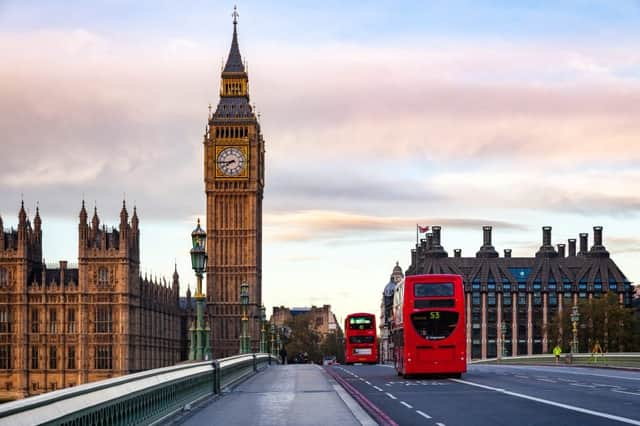This is how lockdown happened in other countries - and what restrictions Britain might face as coronavirus pandemic deepens


The UK government is currently advising Britons to avoid unnecessary social contact and travel amid the coronavirus pandemic, but a full lockdown has not been ruled out, the Prime Minister has said.
MPs are returning to parliament to debate the government’s emergency Coronavirus Bill before it goes to the House of Lords, which could see the UK locked down and forced into self-isolation “very soon”.
Advertisement
Hide AdAdvertisement
Hide AdThe Commons debate comes following a warning from Boris Johnson that the UK is heading towards a lockdown, after urgent appeals to the public to stay indoors were largely ignored over the weekend.
A number of countries have already enforced lockdown in an effort to stem the spread of the virus, including China, Italy and France.
What enforcements have other countries imposed?
In preparation for a potential UK lockdown, here are some of the enforcements that have been imposed in other countries around the world that have been worst affected by the virus outbreak.
Wuhan, China
Wuhan in China, where coronavirus is said to have originated, imposed what is probably the most extreme lockdown so far, with all journeys in and out of the city banned - even for those medical or humanitarian reasons.
Advertisement
Hide AdAdvertisement
Hide AdPublic transport in the city was suspended and private cars were barred from the roads in most circumstances.
Most citizens live in residential blocks or compounds and were faced with barred visits, with only inhabitants, authorities, or carers helping the elderly or disable permitted access.
Schools and universities were already closed for the lunar new year, but this holiday was extended, and most shops were also shut, with only pharmacies and supermarkets kept open.
Residents were only permitted to leave their homes to pick up essential supplies or seek medical help - and those who did leave were required to wear a mask.
Advertisement
Hide AdAdvertisement
Hide AdConditions were tightened two weeks later, with authorities ordering house searches for potentially infected individuals, who were then forced into quarantine.
Some restrictions have now been lifted, with residents in key industries able to return to work. However, schools still remain closed and transport restrictions are still in place.
Italy
Italy shut down the northern region on 8 March, which was hardest hit by the virus, and extended restrictions to the whole country just two days later.
Travel is now only allowed for “urgent, verifiable work situations and emergencies, or health reasons”, and anyone who has tested positive for coronavirus must not leave their homes for any reason.
Advertisement
Hide AdAdvertisement
Hide AdAny citizens who have a fever or respiratory symptoms are also strongly encouraged to stay at home and limit social contact, including with their doctor.
Public and private companies have been urged to put their staff on leave, in a bid to avoid work-related travel, and only supermarkets and pharmacies still remain open.
Both universities and schools are closed, with exams now cancelled, and all gatherings in public places have been banned, not just large-scale events.
Similarly, museums, nightclubs, cinemas, theatres and other leisure venues, including ski resorts, have also closed, and sporting events have been cancelled.
Advertisement
Hide AdAdvertisement
Hide AdReligious institutions have remained open, although people are to stay a metre from one another. Marriage ceremonies, baptisms and funerals have been banned.
France
France went into full lockdown on Tuesday 17 March, with citizens banned from leaving their homes except to buy food or essentials, visit the doctors, or travel to a job that is certified as not being possible to do from home.
Citizens must carry a document that certifies why they are outside, which must be shown to security forces.
USA
San Francisco and five other Bay Area counties in California have ordered all residents to “shelter in place, effective until 7 April.
Advertisement
Hide AdAdvertisement
Hide AdThe voluntary order is directing residents to stay indoors unless absolutely necessary.
All businesses that are considered non-essential, such as bars and gyms, have been ordered to close, but the likes of pharmacies, grocery stores, petrol stations, and restaurants serving takeaway will remain open.
Residents are permitted to leave their homes for essential tasks, but have been asked to keep six feet away from other people.
All non-essential gatherings of any size have also been prohibited, along with non-essential travel on “foot, bicycle, scooter, automobile, or public transit”.
Advertisement
Hide AdAdvertisement
Hide AdAirports, taxis and public transport will still remain operational, but only for essential travel.
How would a UK lockdown work?
The government is currently only advising the public to avoid unnecessary social contact and travel.
People have also been urged not to congregate in places with large numbers, including pubs, clubs, restaurants, and theatres.
Residents in both France and Italy have been told to stay at home during their lockdowns, with members of the public having to apply to make trips.
Advertisement
Hide AdAdvertisement
Hide AdItalian citizens have been asked to make an application to prove that their planned travel is necessary, while in France, only the most essential trips are allowed to be made.
Extra police also patrol the streets of cities like Paris, handing out fines of up to €350 (around £330) to those who flout the rules without good reason.
In most countries affected by lockdowns, residents are still allowed out to stock up on supplies from grocery stores, or to exercise – at a safe distance from others.
If the UK, or London specifically, are to be forced into lockdown, it is expected the country will take a similar approach, with the public banned from all non-essential movements.
Advertisement